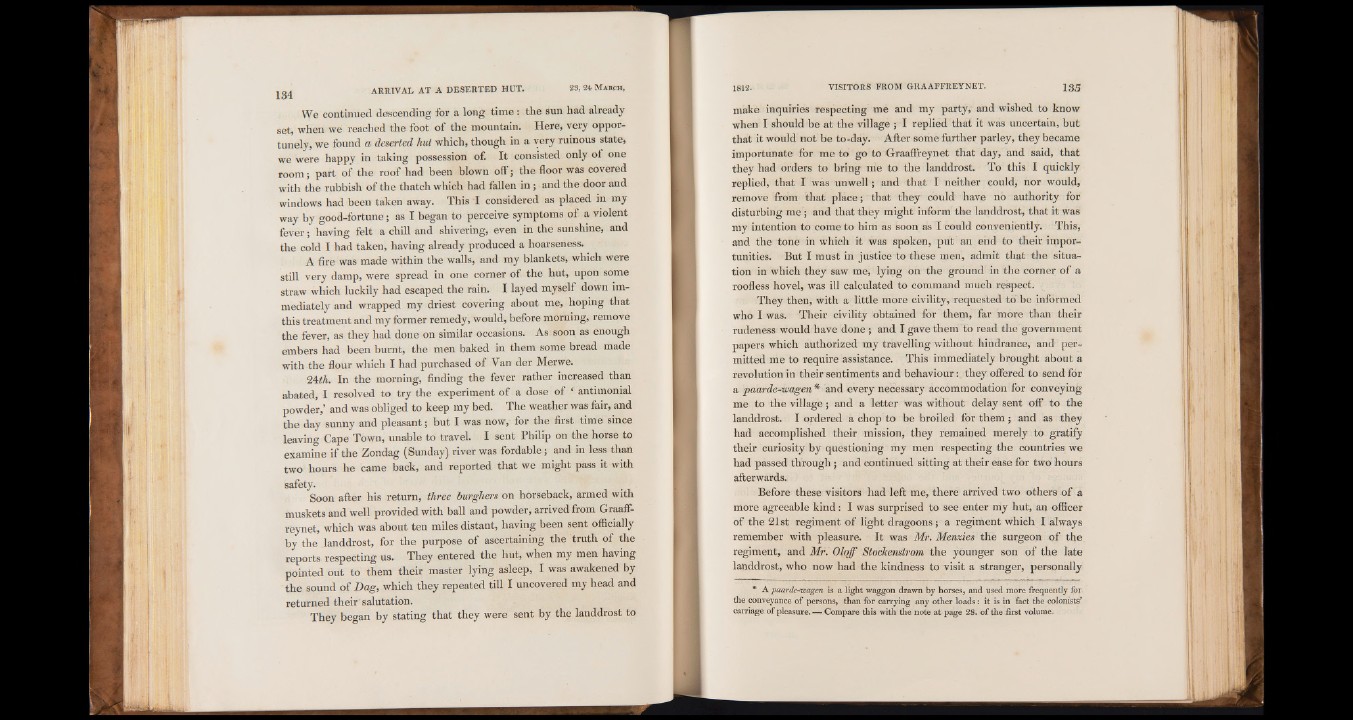
We continued descending for a long tim e*. the sun had already
set, when we reached the foot of the mountain. Here, very opportunely,
we found a deserted hut which, though in a very ruinous state,
we were happy in taking possession of. It consisted only of one
room; part of the roof had been blown off; the floor was covered
with the rubbish of the thatch which had fallen in ; and the door and
windows had been taken away. This I considered as placed in my
way by good-fortune; as I began to perceive symptoms of a violent
fever; having felt a chill and shivering, even in the sunshine, and
the cold I had taken, having already produced a hoarseness.
A fire was made within the walls, and my blankets, which were
still very damp, were spread in one corner of the hut, upon some
straw which luckily had escaped the rain. I layed myself down immediately
and wrapped my driest covering about me, hoping that
this treatment and my former remedy, would, before morning, remove
the fever, as they had done on similar occasions. As soon as enough
embers had been burnt, the men baked in them some bread made
with the flour which I had purchased of Van der Merwe.
24M. In the morning, finding the fever rather increased than
abated, I resolved to try the experiment of a dose of ‘ antimonial
powder,’ and was obliged to keep my bed. The weather was fair, and
the day sunny and pleasant; but I was now, for the first time since
leaving Cape Town, unable to travel. I sent Philip on the horse to
examine if the Zondag (Sunday) river was fordable ; and in less than
two hours he came back, and reported that we might pass it with
safety.S
oon after his return, three burghers on horseback, armed with
muskets and well provided with ball and powder, arrived from Graaffreynet,
which was about ten miles distant, having been sent officially
by the landdrost, for the purpose of ascertaining the truth of the
reports respecting us. They entered the hut, when my men having
pointed out to them their master lying asleep, I was awakened by
the sound of Dag, which they repeated till I uncovered my head and
returned their salutation.
They began by stating that they were sent by the landdrost to
make inquiries respecting me and my party, and wished to know
when I should be at the village ; I replied that it was uncertain, but
that it would not be to-day. After some further parley, they became
importunate for me to go to Graaffreynet that day, and said, that
they had orders to bring me to the landdrost. To this I quickly
replied, that I was unwell ; and that I neither could, nor would,
remove from that place ; that they could have no authority for
disturbing me ; and that they might inform the landdrost, that it was
my intention to come to him as soon as I could conveniently. This,
and the tone in which it was spoken, put an end to their importunities.
But I must in justice to these men, admit that the situation
in which they saw me, lying on the ground in the corner of a
roofless hovel, was ill calculated to command much respect.
They then, with a little more civility, requested to' be informed
who I was. Their civility obtained for them, far more than their
rudeness would have done ; and I gave them to read the government
papers which authorized my travelling without hindrance, and permitted
me to require assistance. This immediately brought about a
revolution in their sentiments and behaviour : they offered to send for
a paarde-wagen * and every necessary accommodation for conveying
me to the village ; and a letter was without delay sent off to the
landdrost. I ordered a chop to be broiled for them ; and as they
had accomplished their mission, they remained merely to gratify
their curiosity by questioning my men respecting the countries we
had passed through ; and continued sitting at their ease for two hours
afterwards.
Before these visitors had left me, there arrived two others o f a
more agreeable kind : I was surprised to see enter my hut, an officer
of the 21st regiment of light dragoons ; a regiment which I always
remember with pleasure. It was Mr. Menzies the surgeon of the
regiment, and Mr. Oloff Stochemtrom the younger son of the late
landdrost, who now had the kindness to visit a stranger, personally
* A paai'de-wagen is a light waggon drawn by horses, and used more frequently for
the conveyance of persons, than for carrying any other loads: it is in fact the colonists’
carriage of pleasure. — Compare this with the note at page 28. of the first volume.